Jean Kerr Stenmark
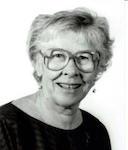
Jean Kerr Stenmark, 1922–2018
Leader, Author, Mentor, and Asessment Innovator
 In July 2018, Jean Kerr Stenmark passed away at the age of 95 and the education community lost a leader whose life had a lasting impact on the mathematics education of young women, students, and families. In July 2018, Jean Kerr Stenmark passed away at the age of 95 and the education community lost a leader whose life had a lasting impact on the mathematics education of young women, students, and families.
Jean Stenmark is probably best known as the lead author of FAMILY MATH, a book that became a guide for countless teachers and parents in hosting their own FAMILY MATH events all over the world. Published in 1986, it is still in print today. However, those of us who were fortunate to work with Jean knew her for her leadership roles in EQUALS, the California Mathematics Council, and her ground-breaking work in the field of K–12 mathematics assessment.
After successful careers as a Navy clerk, airplane technician, and accountant, Jean earned her teaching credential at the age of 44 and began teaching in the Oakland Unified School District, first as a classroom teacher and later as a mathematics resource teacher where Jean found her niche. Paul Giganti, a colleague and mentee of Jean's, writes.
"I first met Jean in the early 70's. As a member of AC3ME, the Alameda, Contra Costa Council of Mathematics Teachers (AC3ME), I was teaching a course on the metric system for teachers (we all thought at the time it was soon to become the US system of measurement!) Jean was one of my "students." I say she was my student, but in our conversations, I soon discovered our roles were really reversed. Apart from the metric system, it was clear I could learn more from Jean than she from me. Our paths didn't cross again for many years until I was hired to work with teachers at the University of California at Berkeley. Fortunately for me, working with Jean was part of my job. Jean taught me how to plan professional development for teachers that was meaningful and professional. The many bits of wisdom I learned from Jean pervades my work to this day."
In 1980 she joined the staff of the EQUALS program at Lawrence Hall of Science (LHS) at UC Berkeley. Jean's calm and sound advice to staff members soon earned her the nickname, Mama Jean. She worked with the EQUALS and FAMILY MATH programs at LHS until her retirement in 1995. Jean's personal beliefs and the philosophy of the EQUALS program were closely aligned. EQUALS' mission was to improve the awareness of gender and race-related issues in mathema
tics education in order to increase participation of female and minority students in mathematics and computer science. EQUALS offered hands-on activity-based awareness programs and workshops for teachers, counselors, administrators, parents, and school board members. EQUALS' programs were effective because they were led by people who understood students, teachers, the classroom, and family life; almost every EQUALS staff had been a classroom teacher, just as Jean.
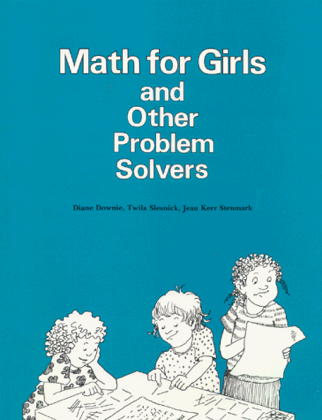 Jean Stenmark was a prolific writer. Largely through her efforts and leadership EQUALS began to develop and publish curriculum materials for teachers. Jean co-authored numerous publications, including Family Math, Math for Girls and Other Problem Solvers, and 101 Short Problems/101 Problemas Cortos. She encouraged other EQUALS staff members to join her in writing EQUALS' books. By her example and with Jean’s advice, her colleagues became better writers. Sherry Fraser, an EQUALS colleague of Jean's, writes, Jean Stenmark was a prolific writer. Largely through her efforts and leadership EQUALS began to develop and publish curriculum materials for teachers. Jean co-authored numerous publications, including Family Math, Math for Girls and Other Problem Solvers, and 101 Short Problems/101 Problemas Cortos. She encouraged other EQUALS staff members to join her in writing EQUALS' books. By her example and with Jean’s advice, her colleagues became better writers. Sherry Fraser, an EQUALS colleague of Jean's, writes, 
"Jean was meticulous in everything she did. When she decided to sell her car, I knew I couldn't go wrong if I bought it. When she handed over the car’s title papers she also gave me a notebook where she had recorded how much gas she had bought along with what kind of gas mileage she got on that tank of gas. And this car was years old! Her attention to detail and her creativity also paid off in the many books she contributed to. The FAMILY MATH books wouldn't have happened without Jean. Jean held my hand throughout my first adventure into curriculum, the SPACES book."
 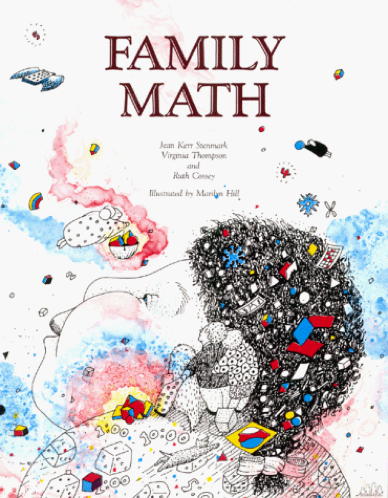 The book with the greatest impact was FAMILY MATH. The book and the FAMILY MATH program at LHS did more to encourage parent engagement and involvement in K-12 mathematics education than any guide published before or since. Translated into several languages, the books had an equal impact in many other countries all over the world. Well over 200,000 copies of FAMILY MATH have found their way into schools, classrooms, and homes. The book with the greatest impact was FAMILY MATH. The book and the FAMILY MATH program at LHS did more to encourage parent engagement and involvement in K-12 mathematics education than any guide published before or since. Translated into several languages, the books had an equal impact in many other countries all over the world. Well over 200,000 copies of FAMILY MATH have found their way into schools, classrooms, and homes.
Jean Stenmark also had a special gift for mentoring others. Jean had a calm, but authoritative demeaner—her advice sounded wise and invariably proved to be right! Many who followed Jean's advice became leaders in mathematics education. Elizabeth Stage, former director at LHS and also a colleague of Jean's at EQUALS, writes,
"Jean had an uncanny ability to nudge me to take steps just outside my comfort zone and provide a safety net with her wry humor and friendship. My first recollection was when she said, 'I've been invited to go to Sacramento for some meeting with a math professor from Davis who's trying to write the textbook adoption rules so they emphasize the math, not the teaching.' I asked, 'Why me?' and she replied, 'It will raise my blood pressure, so you'll be doing me a favor.' I went and listened to Henry Alder, thought about what I'd learned as an EQUALS staff member, and edited his draft so that it was a win-win compromise. That led to my being invited to edit the draft of the document that would become the 1985 Mathematics Framework, catapulting a junior LHS staff member into the spotlight.
"Jean doubled down, telling me that I was going to be invited to run for the California Mathematics Council (CMC) State President-Elect and that I'd better accept the nomination because she'd engineered a by-laws change to make it possible. I didn't dare to question Jean because I'd learned from my experience and by observing the experiences of others that she was the consummate teacher, long before the "growth mindset" had been named; she built on our strengths and shored up our weaknesses by offering achievable stretch goals. She understood that encourage means to give a person courage, and, more important, it was always motivated by love."
Jean Stenmark was also deeply involved in K-12 mathematics education professional organizations beginning with her local affiliate, AC3ME, then CMC, and finally the National Council of Teachers of Mathematics (NCTM). She served as president of the AC3ME and vice-president and president of CMC's Northern Section (CMC-North). As vice president and president of CMC-North, her job was to get other people, all volunteers, to fill the many roles in the organization, then to manage their actions and interactions for success. Since each volunteer's tasks for meant extra work besides his or her real job, getting people to volunteer their time and energy took a special sort of leadership, a role where Jean excelled. Mike Contino, who served AC3ME, CMC-North, and CMC State in many roles remembers,
 "I had been to several Asilomar Math Conferences and agreed to an easy volunteer job assisting the registrar. When I got to Pacific Grove I was invited to the 'stuffing party.' In those days it started around 7 p.m. and ran to the wee hours of the next morning. Jean nourished and guided me through that experience. She also said, 'Thanks for doing this and for agreeing to become the registrar next year.' Somehow, I had missed that part of the job description when I agreed to help! Since then I have seen many CMC-North presidents run frantically around all day Friday and Saturday of Asilomar, not daring to relax until mid-morning Sunday. Jean was the exception. She was calm that entire weekend, seeming to thoroughly enjoy herself and all that was going on. She was always the model of how true leaders should comport themselves." "I had been to several Asilomar Math Conferences and agreed to an easy volunteer job assisting the registrar. When I got to Pacific Grove I was invited to the 'stuffing party.' In those days it started around 7 p.m. and ran to the wee hours of the next morning. Jean nourished and guided me through that experience. She also said, 'Thanks for doing this and for agreeing to become the registrar next year.' Somehow, I had missed that part of the job description when I agreed to help! Since then I have seen many CMC-North presidents run frantically around all day Friday and Saturday of Asilomar, not daring to relax until mid-morning Sunday. Jean was the exception. She was calm that entire weekend, seeming to thoroughly enjoy herself and all that was going on. She was always the model of how true leaders should comport themselves."
There are two possible paths for a CMC president. One is to keep the organization running smoothly and maintain the Council's existing programs. The other is to foster a new role and purpose of the organization to increase its impact on K–12 education. Elizabeth Stage recalls the change in the direction of CMC-North due to Jean's leadership,
"Jean's work on the Asilomar conference program over several years yielded a much stronger program for elementary teachers resulting in greater representation of preK-5 teachers in CMC-North and CMC—more than in NCTM. When I was involved, years later, the CMC delegation to the NCTM Affiliate Assembly advanced a proposal that eventually got NCTM to change the name of the journal from The Arithmetic Teacher to Teaching Children Mathematics."
One of Jean's greatest passions was improving student assessment in mathematics! Jean hated the tyranny of the multiple-choice based student assessments. She believed they failed to reveal most of the mathematics students know. Jean was a leader in helping California and the nation move to holistic and meaningful mathematics assessments for children.
Jean was at the forefront in the revolution called authentic assessment. She worked with the California Department of Education (CDE) for several decades in making significant and lasting improvements in California's student testing. Through Jean and many educators' efforts, the state's assessment system (at the time known as the California Assessment Program and later as the California Learning Assessment System), for 2nd through 11th grade state mathematics were completely revised. The new tests utilizing prompts called constructed response, which required students to respond with brief written answers, and open-ended response questions, which required students to explain their mathematical reasoning behind their answers). Because students responses to these new prompts were much more varied than multiple choice items, they required humans, not computers, to score them reliably. Jean and the others developed rubrics for educators to use as guides in scoring students' constructed response and open-ended problems.

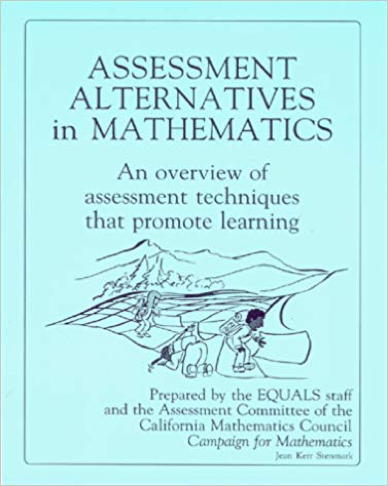 Jean literally wrote the books on mathematics assessment: Mathematics Assessment: Myths, Models, Good Questions, and Practical Suggestions (NCTM 1991), Assessment Alternatives in Mathematics (CMC 1994), and Mathematics Assessment: A Practical Handbook for Grades 3–5 (NCTM 2001). Her books helped build a base of teacher, administrator, and parent understanding and support for alternative assessment. Jean's clear and concise writing style made complex concepts and critical ideas accessible to classroom teachers and administrators, and helped them move away from simple answer, rote-memory exercises towards multi-dimensional problems requiring students to use multiple mathematics skills and express their solutions with logical written explanations, charts, graphs, and diagrams. To this day her books are still a good introduction to alternative assessment in mathematics. Jean literally wrote the books on mathematics assessment: Mathematics Assessment: Myths, Models, Good Questions, and Practical Suggestions (NCTM 1991), Assessment Alternatives in Mathematics (CMC 1994), and Mathematics Assessment: A Practical Handbook for Grades 3–5 (NCTM 2001). Her books helped build a base of teacher, administrator, and parent understanding and support for alternative assessment. Jean's clear and concise writing style made complex concepts and critical ideas accessible to classroom teachers and administrators, and helped them move away from simple answer, rote-memory exercises towards multi-dimensional problems requiring students to use multiple mathematics skills and express their solutions with logical written explanations, charts, graphs, and diagrams. To this day her books are still a good introduction to alternative assessment in mathematics.
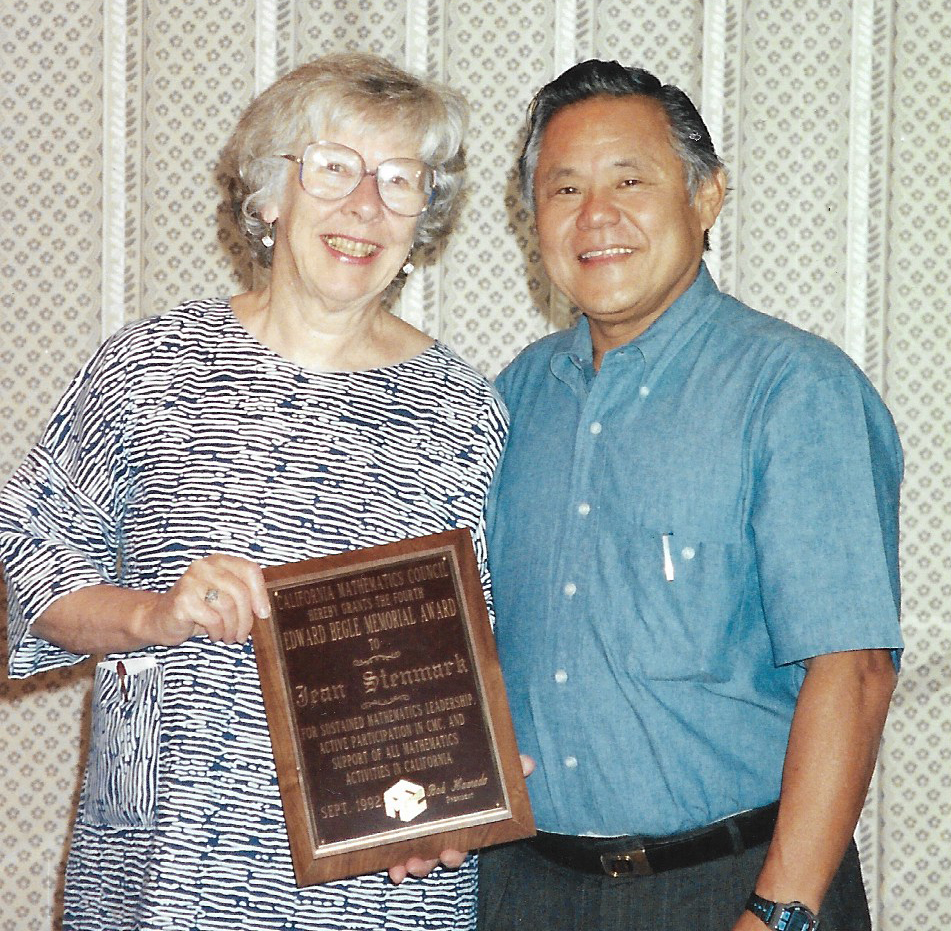
In 1992, CMC presented Jean with the Edward Begle Memorial Award for her accomplishments in CMC, NCTM, CDE, the EQUALS/FAMILY MATH programs, and her extensive work in the area of mathematics assessment.

Jean’s dedication to making mathematics meaningful and accessible to all students was an inspiration, but Jean was also a mentor to many mathematics educators and leaders. Her valuable advice on professional development and empowering teachers has improved mathematics education for all students. Lynne Alper, who worked with Jean at LHS, writes,
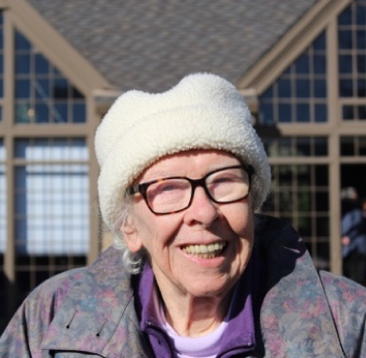 "Jean encompassed integrity in her writings and presentations, loyalty with those with whom she worked, and pleasure in her work. Jean shared her knowledge and experience. Jean had a great, dry sense of humor which brought out the best in educators who worked with her. Of all of her writings, I remember her most when I am teaching FAMILY MATH with teachers and parents who are new to the concept. Adults light up immediately, and can't wait to share with their students and children. I miss you, Mama Jean." "Jean encompassed integrity in her writings and presentations, loyalty with those with whom she worked, and pleasure in her work. Jean shared her knowledge and experience. Jean had a great, dry sense of humor which brought out the best in educators who worked with her. Of all of her writings, I remember her most when I am teaching FAMILY MATH with teachers and parents who are new to the concept. Adults light up immediately, and can't wait to share with their students and children. I miss you, Mama Jean."

by Paul Giganti, Jr., California Math Festival Program, [email protected]
|